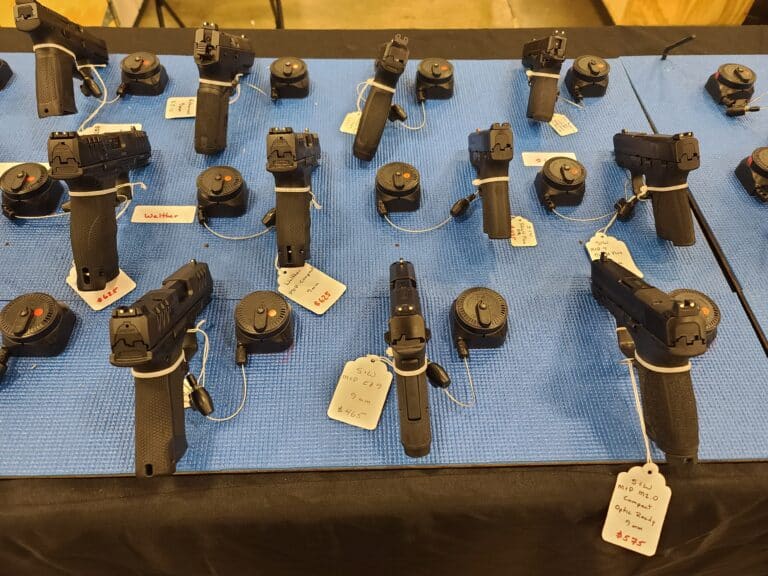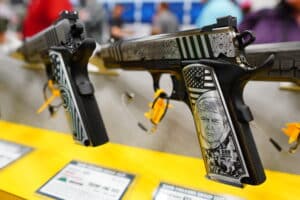Amidst a wide-ranging and, at times, quarrelsome debate between the Republican presidential hopefuls on Wednesday, the eight candidates on the stage broached several topics important to Republican primary voters, from abortion to immigration. However, gun policy and the Second Amendment were notably absent.
The omission of a central tenet of Republican politics is curious for a number of reasons, not least of which is that the candidates were directly asked about the topic in the regular course of the debate.
“This weekend here in Milwaukee, reports say there were 30 shootings, and a number of them including kids. Add that to the big increase in school shootings around the country,” Fox News host Bret Baier said while queuing up the topic for former New Jersey Governor Chris Christie to respond. “Democrats blame this crisis on easy access to guns. They also blame Republicans for blocking gun control legislation. What would President Christie do?”
Christie used the prompt as an opportunity to draw on his background as a federal prosecutor rather than invoke the need to defend gun rights or support the Second Amendment. Instead, he proposed having other federal prosecutors usurp the role of prosecuting violent crime in cities from local officials deemed not up to the task. He also took the opportunity to criticize the President and his son for the illegal gun possession charge the latter currently faces.
The same question was then posed to businessman and relative newcomer to Republican politics, Vivek Ramaswamy. He, too, failed to broach the subject of gun policy and the Second Amendment and instead called for for increased policing and the return of mental asylums. That was the last time guns were mentioned in the debate, as the discussion proceeded to meander between a general discussion of crime and whether Americans have a crisis of national identity before ultimately moving on to new topics.
To say a lack of discussion on gun policy was a missed opportunity for the candidates is perhaps an understatement. Each of the candidates on stage Wednesday night has found themselves consistently trailing former President Donald Trump in the polls by sizeable margins. Yet, Trump has clear weak spots to his right on guns.
He failed to achieve any substantial pro-gun legislative wins during his tenure in office, and even endorsed stricter gun laws in the wake of the Parkland shooting—saying, “take the guns first, go through due process second” in support of a national “red flag” law. He also unilaterally instituted the federal bump stock ban after the Las Vegas shooting. That ban has now been found unconstitutional by two federal appeals courts.
Florida Governor Ron DeSantis (R.) let what seemed to be an obvious opportunity to go after Trump and to differentiate himself from the pack. Fresh off of his re-election victory in 2022, DeSantis signed a bill eliminating permitting requirements for lawful adults over 21 to carry a concealed firearm. That made Florida the 25th state to do so and the second-largest behind Texas. He also successfully pushed for and enacted new regulations that prevent banks from denying loans and accounts to people for lawfully owning guns or operating gun businesses.
DeSantis is one of the only Republicans currently running with a recent record of tangible pro-gun policy wins to stand on—a handy ace in the hole to have for a campaign beginning to show signs of sputtering.
Several of the other candidates on stage with gubernatorial experience boast similar track records of signing pro-gun bills into law. Longshot candidates Asa Hutchinson and Doug Burgum each signed bills expanding gun carry in 2017 as the Governors of Arkansas and North Dakota, respectively—campus carry for Hutchinson and permitless carry in the case of Burgum. Additionally, then-Governor Hutchinson signed a bill to make Arkansas a so-called “Second Amendment Sanctuary” state in 2021.
Senator Tim Scott, who lacks the resume of passing pro-gun legislation of some of his counterparts on the debate stage, could at least have pointed to his voting record on gun legislation in Congress, such as his “No” vote on the Bipartisan Safer Communities Act last Summer. Even Vivek Ramaswamy, who lacks any tangible political record to speak of, has previously expressed support for abolishing the ATF and passing a “national constitutional carry” law. Those sentiments, particularly regarding the ATF, are unlikely to be voiced by many of the other candidates on stage and would have certainly served to set Ramaswamy apart from the pack with Republican primary voters, one way or the other.
Gun politics has loomed large in American civic life recently. Since the last Presidential election, the country has experienced an extended period of record-setting gun sales, a massive spike in first-time gun ownership, a landmark Supreme Court decision affirming the right to carry a firearm in public for self-defense, a litany of lower court decisions casting doubt on all sorts of gun-control laws, and a current Presidential administration more committed than any other since at least the Clinton Era to enacting new gun restrictions.
These factors create fertile ground for the candidates to try and shore up support from a Republican primary electorate staunchly opposed to new gun-control laws. A CBS News/YouGov poll conducted earlier this year found that 66 percent of likely Republican primary voters prefer a presidential candidate who “opposes any gun restrictions.” That was second only to a candidate who “challenges woke ideas” on the list of top preferences for respondents. And a new AP-NORC poll conducted earlier this month found that support for stricter gun laws has dropped dramatically for Republican voters to just 32 percent, down 17 points from just a year prior.
Couple these trends with the need for trailing primary candidates to differentiate themselves from one another and the current frontrunner, and it’s clear that gun policy could be a real opportunity for certain candidates.
The next debate comes in late September. We’ll see if the candidates think better of remaining silent on Second Amendment issues then.





